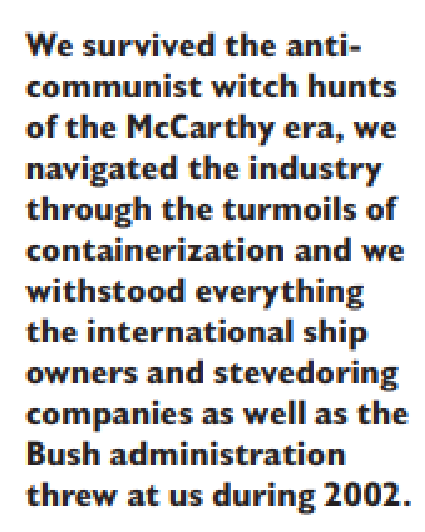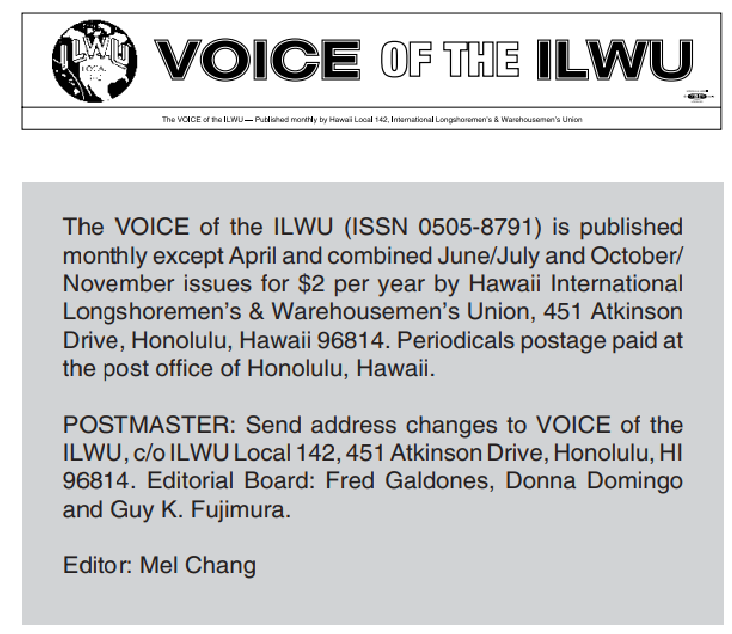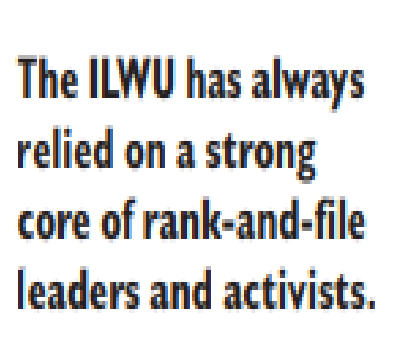November 3 was a hard day to face. For nearly a year-and-a-half the ILWU and most of the rest of the American labor movement poured its heart, soul and resources into the effort to defeat Bush and his radical anti-worker agenda. We had great hopes we could get off the defensive and start moving an agenda to improve the lives of American workers. But that did not work out.
Still, it is not cause for despair. Much was accomplished in the effort, and that will be important as we move on in our mission protect and advance the interests of ILWU members and all workers.
But before I review those accomplishments, I want to acknowledge the hard work, the dedication and the solidarity of all our members who stepped up, answered the call to action and did an incredible job. To those who left their homes and traveled to other states to help get out the union vote, to those who walked in precincts or phone banked in their home towns, to those who wrote checks so the work could keep going, to all of you I want to extend my personal thanks and appreciation. You continue to impress me and renew my faith in the rank and file of this great union.
We face a monumental task. I do not mean to minimize it in any way. Still the situation is not all doom and gloom. John Kerry may have lost, but that doesn’t mean the ILWU has lost. We can and will still fight, survive and thrive. We know that even if Kerry had won we would not be on easy street. We would still have to face determined employers bent on making ever more profits at the expense of our members. We would still have to face the ravages of free trade agreements and corporate globalization. We would still be fighting for a real solution to the healthcare crisis.

The point is we have to put the election in a long-term perspective. This defeat certainly puts up a major hurdle for us to overcome. But we have to keep in mind that the ILWU has been tacking against the wind for 70 years—ever since its birth in 1934 when our predecessor took a casualized work force with Third World-like conditions and wages and turned it into one of the proudest and most powerful unions in the world. We survived the anticommunist witch hunts of the McCarthy era, we navigated the industry through the turmoils of containerization and we withstood everything the international ship owners and stevedoring companies as well as the Bush administration threw at us during 2002. Our legacy is courage and survival in times of adversity. I am sure we will show nothing less in the days ahead.
Already we have begun to build a structure to do just that. We have redesigned and rebuild our union’s web site, www.ilwu.org. It will not only enable us to keep our membership informed and activated, it will also provide a clear, articulate and progressive public face to the international labor movement, the media and the general populace. We have only begun the first small steps in this medium where our reach is bounded only by our imagination, resources and commitment.
We have also initiated a new public relations program to make sure our voice and opinions are heard throughout the industry, the halls of Congress and the world. One thing we learned the 2002 longshore contract struggle is that when we can articulate our perspective to the public, we gain wider support. We have an important and compelling side of the story and when we tell it, it matters.

We have also embarked on a major membership education program. The ILWU has always relied on a strong core of rankand-file leaders and activists. Through a regular series of education and training seminars, the current International and Coast Officers are not only building the support structure for today’s battles, but the leadership for tomorrow’s.
The union-wide political action network we fashioned over the last year is poised and ready to meet the tough challenges ahead. Our International Officers, our District Councils and our Longshore Division’s Legislative Action Committee have already scored numerous victories for the ILWU. Now our seasoned and connected activists are positioned to take our cause a step further. While we face these difficult times, we have to always recall that although we may have lost this election, only the hard work of the labor movement made it close. And that work wasn’t wasted. We now have many more members trained in political organizing skills, inspired by the organizing work they took part in and better-connected with union brothers and sisters in their own communities and around the country. We have learned a lot through this experience and, hopefully, we will continue to learn more. Although we have good programs in place, we have to reevaluate them in light of today’s circumstances. We have to keep asking ourselves, “How do we best organize our political work? How do we best communicate our message to our members, politicians and the general public? How do we continue to position ourselves for the next round of collective bargaining?”

Whatever the vote count, the ILWU is still here and we will be here tomorrow. We have a solid foundation and we’re forever building for the future. We just need to stay focused and keep working. ◆

James Spinosa
International President
WORDS & PHRASES TO KNOW
free trade—“Free trade” is a phrase that sounds good but has nothing to do with “free” or fair trade. It is really about global corporations wanting unlimited access to a country’s market and economy. Unions believe in the concept of “fair” trade, which allows trade while protecting worker rights, such as the right to join a union or the right to safe working conditions. Fair trade upholds laws that protect the environment, promotes sustainable development and works toward equity between trading nations.
corporate (or economic) globalization—the expansion of businesses or corporations so that they are worldwide in scope—including production, communication, distribution and corporate culture. This has been aided by the trend in deregulation of businesses and removal of restrictions on capital flows (see Free Trade).
McCarthy era—Refers to a period of time from 1948 to about 1956 when the U.S. government—specifically Sen. Joseph R. McCarthy—targeted so-called subversives using tactics such as unsubstantiated personal attacks. The word McCarthyism was coined, meaning: “1) The practice of publicizing accusations of political disloyalty or subversion with insufficient regard to evidence. 2) The use of unfair investigatory or accusatory methods in order to suppress opposition.” [American Heritage Dictionary of the English Language, 4th Ed.]
containerization—To convert to the use of containerized cargo. Containerized cargo is cargo packaged in large, standardized containers. Containerization was developed as a more efficient means of handling and shipping goods.
